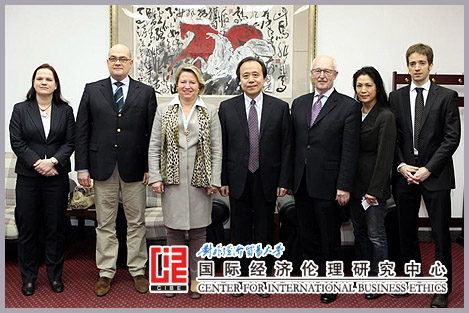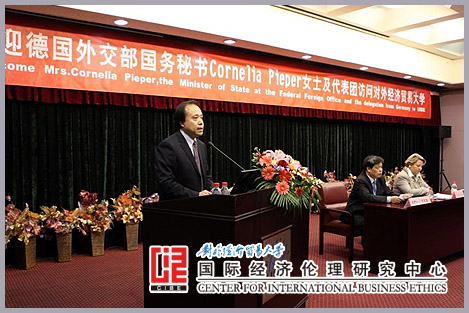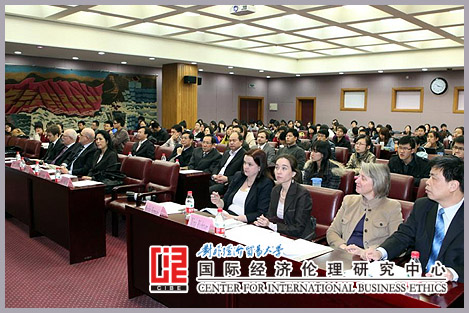At 10A.M., Mar. 27th, Mrs. Cornelia Pieper, the Minister of State at the Federal Foreign Office of Germany, visited UIBE. During the visit, she gave a lecture entitled“Change of German Energy Policy, Challenges for German Foreign Policy” at the International Conference Hall at the 3rd floor of Chengxin Building. This conference was co-hosted by the SCOT and CIBE. Prof. Liu Ya, the Vice President of UIBE, and attended by more than 100 UIBE students and faculty members.

Prof. Liu Ya, Vice President of UIBE, Mrs. Cornelia Pieper and the members of German delegation
Prof. Liu Yacontended that as one of Europe’s most powerful nations, Germany has exhibited foresight and superiorpractice in the field of energy, while maintaining an amicable relationship with China. Prof. Liu expressed the hope that such lectures could both deepen understanding of German energy policies and reinforce bilateral cooperation in the field.

Mr. Liu Ya, Vice President of UIBE, making a speech
Following Prof. Liu’s speech, Mrs. Cornelia Pieper began her lecture by expressing her appreciation for the opportunity to interact with the UIBE community.Then, Mrs. Pieper asserted that the most significant challenges of the 21st century are energy security, environmental protection and climate change.Thus, these issues compose the core of the German foreign policy, as well as the key aspects of Sino-Germany Strategic Partnership.

Mrs. Cornelia Pieper making a speech
After the lecture, students raised many questions. One of the students asked that since both China and Germany put great emphasis on development of clean energy, how would Germany act to deepen the cooperation with China in this field? Mrs. Pieper, carefully taking notes on the students’ question,responded that as both countries put more and more emphasis on development of clean energy, the cooperation between the two countries will inevitablydeepen.She stated that Germany has been actively promoting cooperation with Chinese universities and research institutes in recent years, and has begun to give more financial support to related technology research and development. For example, Germany has set up scholarships with Chinese universities to attract more young people to take part in research and development of clean energy. Mrs. Pieper brought the lecture to a close with an appeal to the students, saying, “Any of the students presented is welcomed to take part in research and development of clean energy and apply for the scholarship if he has a will.”

Audiences at the conference
|
